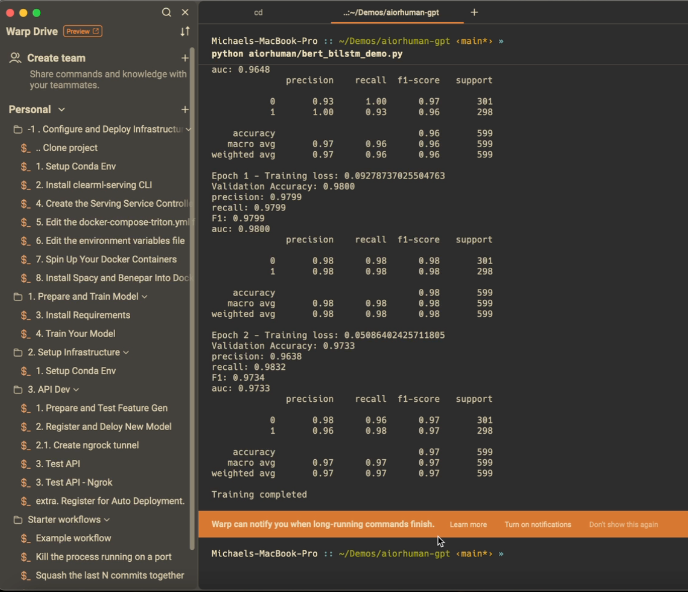aiorhuman-gpt
←Back
Build and Deploy API
Model is Good to Go

Quick Review
- Go to clearml webui and expore, model, metrics, publishing.
- Review infrastructre diagram again.
Setup API and Inference
Head back to your project and look at ‘aiorhuman/preprocess.py’
Impliment these.
class Preprocess(object):
def __init__(self):
self.model = BERTBiLSTMClassifier(
bert_model_name='bert-base-uncased',
num_classes=2,
dropout_rate=0.1,
lstm_hidden_size=128,
lstm_layers=2
)
self.model.load_state_dict(torch.load('bert_bilstm_model.pt')) # Load your trained model weights - this is pulled from clearml artifact storage (anywhere, aws, drive)
self.model.eval() # Set the model to evaluation mode
self.tokenizer = BertTokenizer.from_pretrained('bert-base-uncased')
self.max_length = 128
def preprocess(self, body: Union[bytes, dict], state: dict, collect_custom_statistics_fn: Optional[Callable[[dict], None]]) -> Any:
def process(self, data: Any, state: dict, collect_custom_statistics_fn: Optional[Callable[[dict], None]]) -> Any:
def postprocess(self, data: Any, state: dict, collect_custom_statistics_fn: Optional[Callable[[dict], None]]) -> dict:
Test the feature generation.
Run:
python aiorhuman/tests/features.py
Deploy Inference and Orchistrate Model.
Make sure you put in your proper -id and model-id from your clearml-server
clearml-serving --id db2a93a7d21042f0a81c075747edbd74 model add \
--engine triton --endpoint "bert_infer_demo" \
--preprocess "aiorhuman-gpt/aiorhuman/preprocess.py" \
--model-id 6cca54290c5d426dbcc088201274656e \
--input-size 1 128 \
--input-name "input_ids" \
--input-type float32 \
--output-size -1 2 \
--output-name "output" \
--output-type float32 \
--tags "bert-infer-add"
OR (explain auto publishing and canary deployments)
clearml-serving --id 57187db30bfa46f5876ea198f3e46ecb model auto-update
--engine triton --endpoint "bert_infer_demo" \
--preprocess "aiorhuman-gpt/aiorhuman/preprocess.py" \
--model-id 6cca54290c5d426dbcc088201274656e \
--input-size 1 128 \
--input-name "input_ids" \
--input-type float32 \
--output-size -1 2 \
--output-name "output" \
--output-type float32 \
--tags "bert_infer-add" \
--max-versions 2 \
--tags "bert-infer-autoupdate"
Have on Deck
clearml-serving model remove -h --endpoint 'bert_infer_demo'
Wait 5 Min
really. don’t get impatient when you do the above. it takes a hot minute to refresh.
Install ngrok if you have not! GPTs will not run localhost.
- https://ngrok.com/ and create a tunnel to your local machine inference server. you’ll need this to work with custom GPT actions
ngrok config add-authtoken <TOKEN> ngrok http http://localhost:8080
Test your api.
- Update your test files with service ids
python aiorhuman/tests/api.py - In code ```python import requests import json
def test_model(text, endpoint_url): # Prepare the request payload payload = json.dumps({ “text”: text }) # Send a POST request to the model endpoint response = requests.post(endpoint_url, data=payload, headers={‘Content-Type’: ‘application/json’})
# Parse the response
if response.status_code == 200:
print("Response from model:", response.json())
else:
print("Failed to get response, status code:", response.status_code)
Example usage
text_sample = “As the education landscape continues to evolve, the debate over the benefits of students attending school from home has become increasingly relevant.” model_endpoint_url = “https://4435-173-31-239-51.ngrok-free.app/serve/bert_infer”
test_model(text_sample, model_endpoint_url)
3. Curl
```curl
curl -X POST "https://4435-173-31-239-51.ngrok-free.app/serve/bert_infer" \
-H "Content-Type: application/json" \
-d "{\"text\":\"This is a test essay. As the education landscape continues to evolve, the debate over the benefits of students attending school from home has become increasingly relevant.\"}"
- Postman. You can grab the collection from here
Word. Moving on.